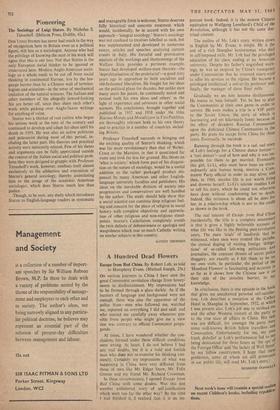Pioneering
The Sociology of Luigi Sturzo. By Nicholas S. Timasheff. (Helicon Press, Dublin, 42s.) DON Lutot S-ruazo has never had much in the way of recognition here in Britain even as a political figure, still less as a sociologist. Anyone who had the privilege of knowing the man or his work will agree that this is our loss. Not that Sturzo is the only European social thinker to be ignored or underrated here. Modern Anglo-American socio- logy as a whole tends to be cut off from social thinking in continental Europe, less by the lan- guage barrier than by a Chinese wall of termino- logism and scientism—in the sense of mechanical imitation of the natural sciences. The Italians and other members of the allegedly inward-looking Six are better off, since they share each other's work while picking over Anglo-Saxon writings for anything of value.
Sturzo was a thinker of real calibre who began his serious work at the turn of the century and continued to develop and adapt his ideas until his death in 1959. He was also an active politician and polemicist during most of this period, in- cluding the latter part. His theories and practical activity were intricately related. Few of his theses and arguments can be fully appreciated outside the context of the Italian social and political prob- lems they were designed to grapple with. Professor Timasheff's work, however, confines itself almost exclusively to the adduction and exposition of Sturzo's general sociology, thereby assimilating him to the image of the academic American sociologist, which does Sturzo much less than justice.
Though, to be sure, any study which introduces Sturzo to English-language readers in systematic
and manageable form is welcome, Sturzo deserves fully historical and concrete treatment which would, incidentally, be in accord with his own approach—`integral sociology.' Sturzo's sociology was not confined to treatises labelled as such, but was supplemented and developed in numerous essays, articles and speeches analysing current events in Italy, His forceful and provocative analysis of the workings and shortcomings of the Welfare State provides a pertinent example. Sturzo had developed welfare-state theories—the `deproletarisation of the proletariat'—a good sixty years ago in opposition to both socialism and old-fashioned liberalism. He fought for his ideas on the political plane for decades, but unlike men many years his junior, he continually tested and revised both his own ideas and others' in the light of experience and advances in other social sciences. His conclusions, brought together and published in 1957 and 1958 under the titles Riarmo Morale and Moralizzare la Vita Pubblica, are thoroughly relevant both to his own theory and to practice in a number of countries. includ- ing Britain.
Professor Timasheff succeeds in bringing out the exciting quality of Sturzo's thinking, which was far more revolutionary than that of Weber, Croce or the Marxists, in that it questioned far more and took far less for granted. His theses on `what is society,' which form part of his disquisi- tion on the nature of sociology, would be a useful addition to the rather packaged product dis- pensed by many American and other English- language university faculties and publishers. His ideas on the inevitable division of society into progressives and conservatives are well handled by the author. The study should help show that a social scientist can combine deep religious feel- ing and concern for the place of religion in social history with complete objectivity and apprecia- tion of other religious and non-religious stand- points. Sturzo's Catholicism completely avoids the twin defects of defensiveness or apologia and waspishness which mar so much Catholic writing on similar subjects in this country.
ALFRED SHERMAN


































 Previous page
Previous page